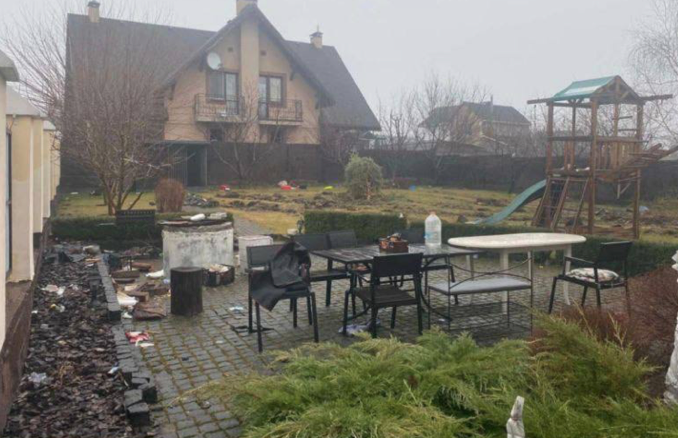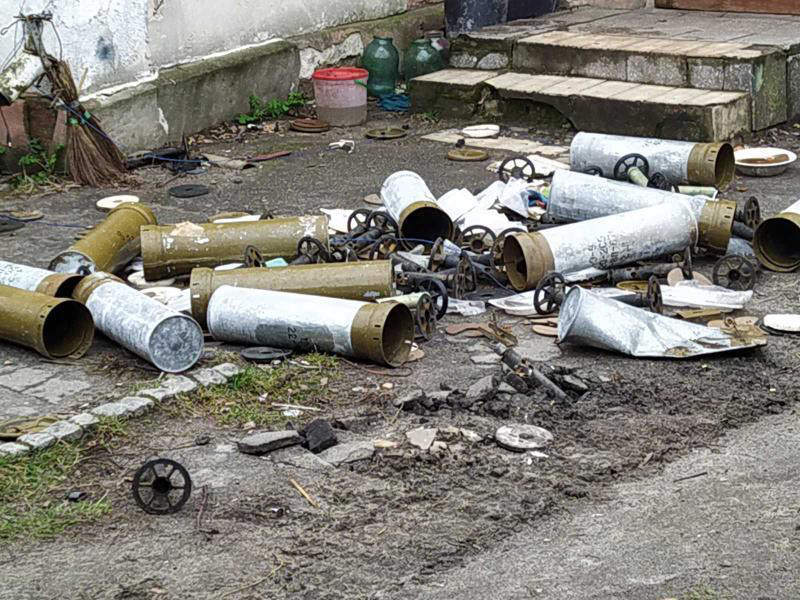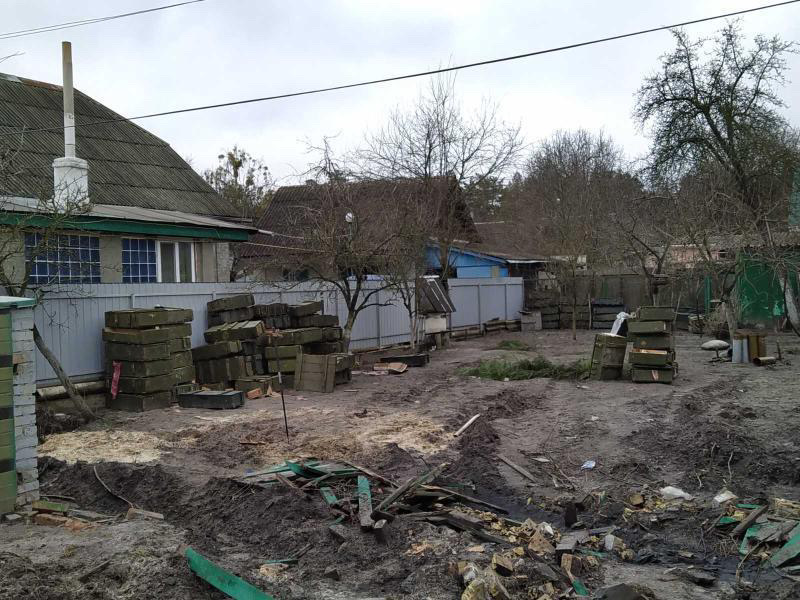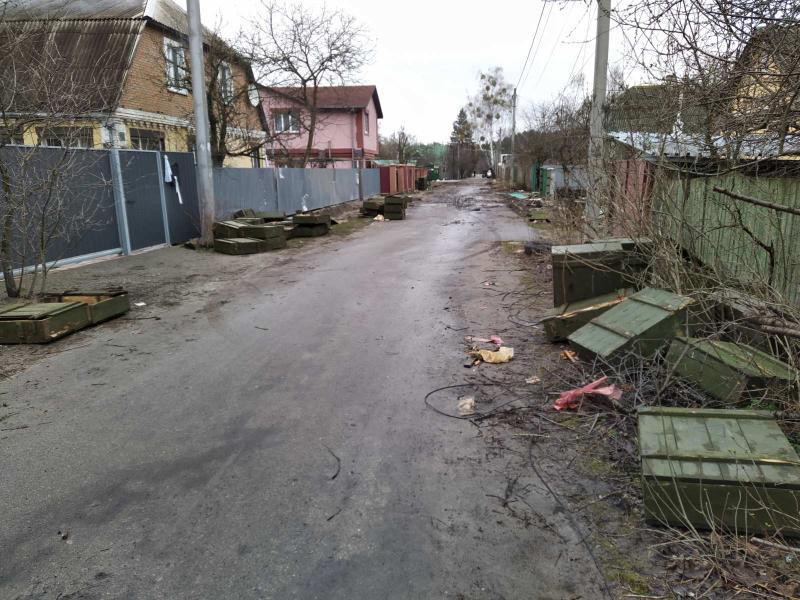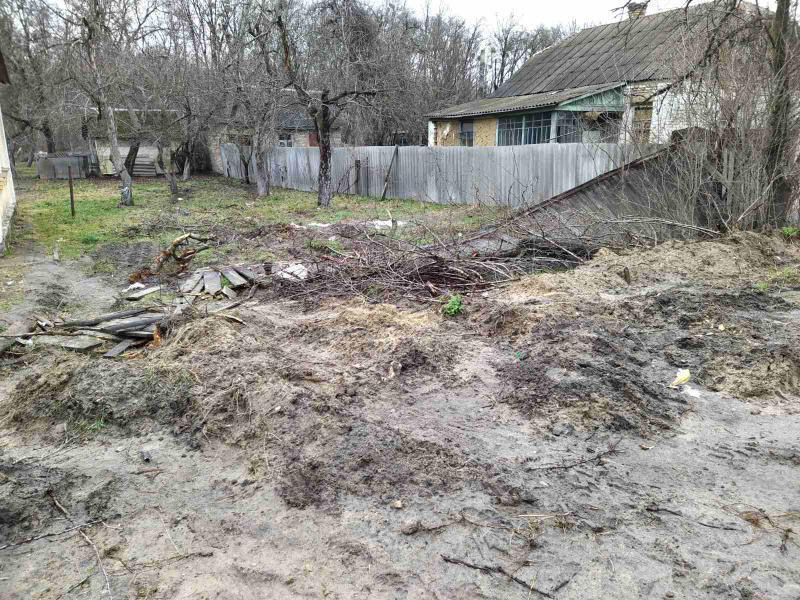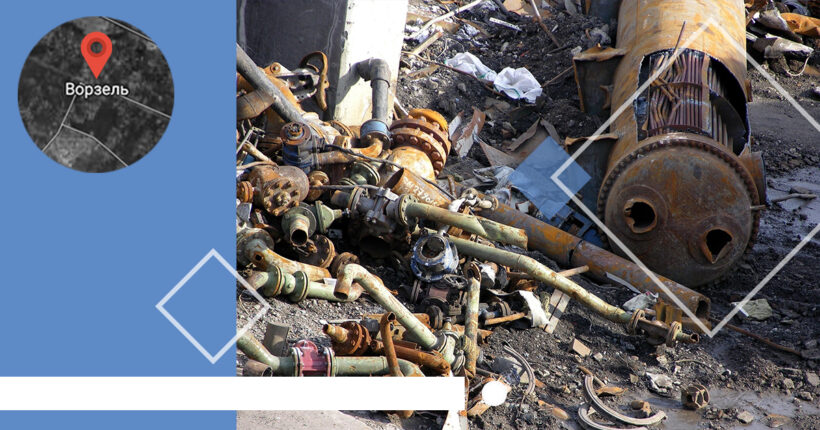
This story is a narration of Alina from Vorzel, who spent the entire occupation in the city, in her own house. Rubryka contacted the woman on the 5th of April, a few days after the Ukrainian flag was hoisted over the city again. Alina told us what the month under occupation was like. Without changing anything, we publish her story.
"The war caught us from the very beginning. My husband's father was working at the airport in Hostomel that day. Our house is near the railway, and from the second floor, we can see planes landing and taking off from the airport. And starting on February 24 we saw Hostomel being shelled. My father managed to get out of it under bullets at about 12 o'clock in the afternoon."
Alina's husband Yehor's father is one of the two gas station workers in Ukraine who had access to the gas station which served the largest plane in the whole world Mriya. At that time, the russian landing party began to land, the airport was pelted with grenades, and machine-gun fire was being fired.
About 2-3 days later the rashists [a compound of two words, russian+fascist – ed.] went to Vorzel, most of them to Kicheievo [Kicheievo is a railway station in Vorzel – ed.], where our house is located. On the next street, they set up headquarters and immediately occupied empty houses. Those people who had such an opportunity to leave the city left their homes, and the russians settled in the wealthiest of them."
Interrupting Alina's story, let us remind you about the house of Oleksandr Usyk, a famous Ukrainian boxer, in the yard of which russians arranged a feast.
"They set up their headquarters two streets from our estate. We saw russian vehicles passing by us right under our windows. In the first days, there were still some services like mobile service, but not the Internet, so we called the hotline of the Ukrainian Armed Forces, to report how many vehicles arrived… As much as it was possible.
We haven't gone outside; it was scary. Because when you only have a spade as a means of defense against the barrel of a tank looking at you, it is incomparable. We spent one night in the basement because of serious shelling from the railway station which is just below our house. We understood that if the response came from the positions of the rashists, we would be affected. We were very afraid of that, because we have two elderly people, and both are on IV bags; they need to be taken care of. In fact, that's why we stayed at home because they were not transportable."
They used to drive to private plots by tanks, inspect houses, and take things
Alina told us how russian soldiers dug in right inside the village; russians were digging into the fields from many houses between Nemishaiev and Mykhailivka-Rubezhivka. According to the woman, the russian occupiers simply set up firing positions inside the houses, and also left tanks under the walls of these houses; traces of them still remain in shattered flower beds and deformed gardens.
"And then the robberies began. They came, and checked the houses. They wanted to find some fire adjusters. They didn't come to us, but they came to our neighbors. I don't even know why they didn't come to us. Probably, because they were standing near our estate anyway. They saw and knew who we were and where we were. But they were visiting our neighbors, and quite often. They took everything: baby things, diapers, even shoes for a one-and-a-half-year-old child! The rashists even stole a wheelchair from granny, whom we helped clean the house after Vorzel's liberation. They completely destroyed the shops, and took everything away from here."
Those who went to the railway were shot dead
"The elderly people were not particularly hurt, but this approach was set only by the 'first' rashists. After the soldiers of Ramzan Kadyrov came in, they decided to create a nightmare for everyone; they shot anyone who showed up next to their checkpoint. It turned out that Kicheievo had been cut off by the rashists checkpoints from Vorzel. And if in Vorzel it was possible at least to lay hands on something to eat, then Kicheievo had neither a store nor pharmacies."
Then mobile service disappeared in Vorzel. On the 5th of April, when we talked to Alina, there was still no connection; we managed to contact the woman only when she went to the pharmacy in Bilohorodka.
"The only place you can contact someone is near the railway station. There were Grad missile launchers and mortars so you had to have the guts to go out and call someone. Those of us who decided that they could do it now are buried there, not far from the church as they were shot, these were their last calls, we saw it all from the windows of our house, you know, it's very emotionally hard when you can't do anything, you just watch, you're under occupation and there is nothing you can do."
These people were buried by a priest from Vorzel. One of the villagers helped to take out the bodies on the wheelbarrows. But, as Alina says, it is very difficult to bury a person normally when violent battles are going on; the bodies were simply covered with earth. After the liberation of the territory, when the police arrived, the villagers identified corpses and also said where they were laying, so exhumation and reburial are still ahead. But not everyone was destined to be buried, even temporarily.
"I saw the executed corpse of a civilian on the street. Someone covered it with a tarpaulin so that dogs would not pull the mutilated body to pieces, and I recognized a neighbor who was a school bus driver in this body. The day before he was shot, I saw him at the 'watering hole,' near the well."
Three loaves of bread a day for twelve families
In order to somehow support herself and others, Alina began to bake bread. She had to do it in the oven in the sauna. They collected a little flour from those who still had leftovers and baked 3 loaves a day for twelve families, who were going to each other's houses by yards. There was no meat, nor was there any milk or butter; after the electricity was cut off, it was over in a day or two, but in private homes, there were food cans in the basements, so they maintained with them and bread.
"There were six adults and six children in one yard. We baked bread and gave them half of a loaf daily; we had to distribute it somehow. We rallied, tried to bring some water or just talk to someone. There was no connection and we didn't know who stayed, who left, and who went out on foot…"
"We'll shoot to kill anyone who peeps out of the house"
"After the Kadyrovites [soldiers of Ramzan Kadyrov – ed.] came, it was a little easier, but not for long. The Buryats came and they tried to behave as if they were bringing peace, but they still robbed the houses after rashists did. The things of the civilians that the rashists and Kadyrovites didn't take, were taken by the Buryats."
Then snipers came, and everyone they came across on the street was put a machine gun to their temples and ordered to pass around: "Tell others that we will shoot to kill everyone who comes out of the house," Alina's family heard about this from a neighbor, who still went to them and warned that for some time it's better not to leave the farmsteads, even to bring bread. Those who did not receive this information were shot, says Alina.
The personnel of the russians was constantly changing. After the Buryats and snipers left, a column of tanks entered. The rashists have already begun to enter the houses where people and elderly were hiding. russian soldiers took things out of the elderly people's houses while they hid in the basements, and tanks were driven back to their yards.
"Humanitarian aid" from russian soldiers and collaborationism
"The rashists tried to distribute humanitarian aid. I want you to understand: it is impossible not to take food when it is not available at all, no matter who distributes it there. We took the aid and saw that all this food is the products robbed from our destroyed stores. It was not rascist 'aid,' but our Ukrainian products, so we took it because three loaves of bread for twelve families is nothing to survive in the occupation… Such an 'initiative' with humanitarian aid took place only once.
I will not lie: there were two people who were very loyal to the rashists, and they, in turn, brought them water, cigarettes, and some alcohol. I think these people will be punished for collaborationism, and we will also turn away when we see them."
How the occupiers amused themselves
"When we went out, we saw that next to each package of their C-ration there was a bottle of vodka or beer. And everything was from our shops. And it was clear: where they ate, there they drank, and there they took a shit. And it's not an allegory! They shat everywhere they went: in the private houses, right in the middle of the rooms, in the kitchen. That's how it was. We saw it when we helped elderly people return to their homes. It was extremely disgusting."
By the way, here is a BBC article from several years ago, which talks about "fecal maniacs," people who cockily defecate in public places. There are comments from psychologists who confirm that those who behave this way clearly have certain mental disorders, and this is a classic example of scatology. Search in google what it is, because the occupiers are not limited to scatology only.
"When the rashists got drunk, they showed the locals how they could handle weapons. Do you know what a grenade launcher is? They were shooting with them and even laughed, saying, 'Look what we can.' One day, a grenade exploded near people who were carrying water home. Thank God, everyone survived, but they were scared to death! And after that, people did not leave their homes for about two days."
This continued daily, for almost three weeks in a row.
After liberation
"They started leaving Vorzel 3-4 days ago. Then we didn't realize: is it regrouping? Are they going to their position? Will the next ones come?… We just watched the machinery roam here and there. Then our neighbor ran to our house and shouted, 'Ours soldiers are in Rubezhivka!' and we… You won't believe it until you see it, so we started to go out and observe what happened there during that time. All the time during the occupation, we moved in short runs, we didn't even look up because everything was whistling, exploding somewhere above our heads. We started going into houses and raking up everything that the rashists had left…"
There are many bodies in basements and yards. Now the police are driving and questioning people to identify them, but some are murdered in such a drastic way that it is impossible to do it. Those who could be identified were buried, those who were not identified are also buried in nameless graves because people need to be honored, their bodies can no longer be left as they have begun to decompose.
"The first people we saw were our police. But then we wondered, 'Are these definitely ours, or are they russia werewolves?' We had an opportunity to listen to Ukrainian radio, we knew that rashists could organize some sabotage, like changing clothes. We didn't believe it until we saw Ukrainian soldiers with a good Ukrainian language who knew the area. Finally, we believed that the city was liberated only when we saw our fellow neighbors among the militarians.
We don't feel relaxed yet. We do not know what may happen tomorrow or the day after tomorrow. Yesterday, for example, a UAV was shot down over us. Who does it belong to? We don't know, but if it's shot down, it's probably not ours. So we are keeping in focus, trying to call our relatives…"
Alina's parents stayed in Mariupol. She has not been in contact with them for a month, and the latest information was a week ago:
"We talked to our relative, who was taken to russia. My parents were still alive then, but it is unknown what's happening with them now."
It is also unknown what is happening to thousands of other Ukrainians, and it is unknown how much more grief we will have to endure when we learn the truth about Mariupol, Borodianka, and other occupied cities. How much more grief, violence, and ignorance can the rashists bring to our land?
Newsletter
Digest of the most interesting news: just about the main thing



